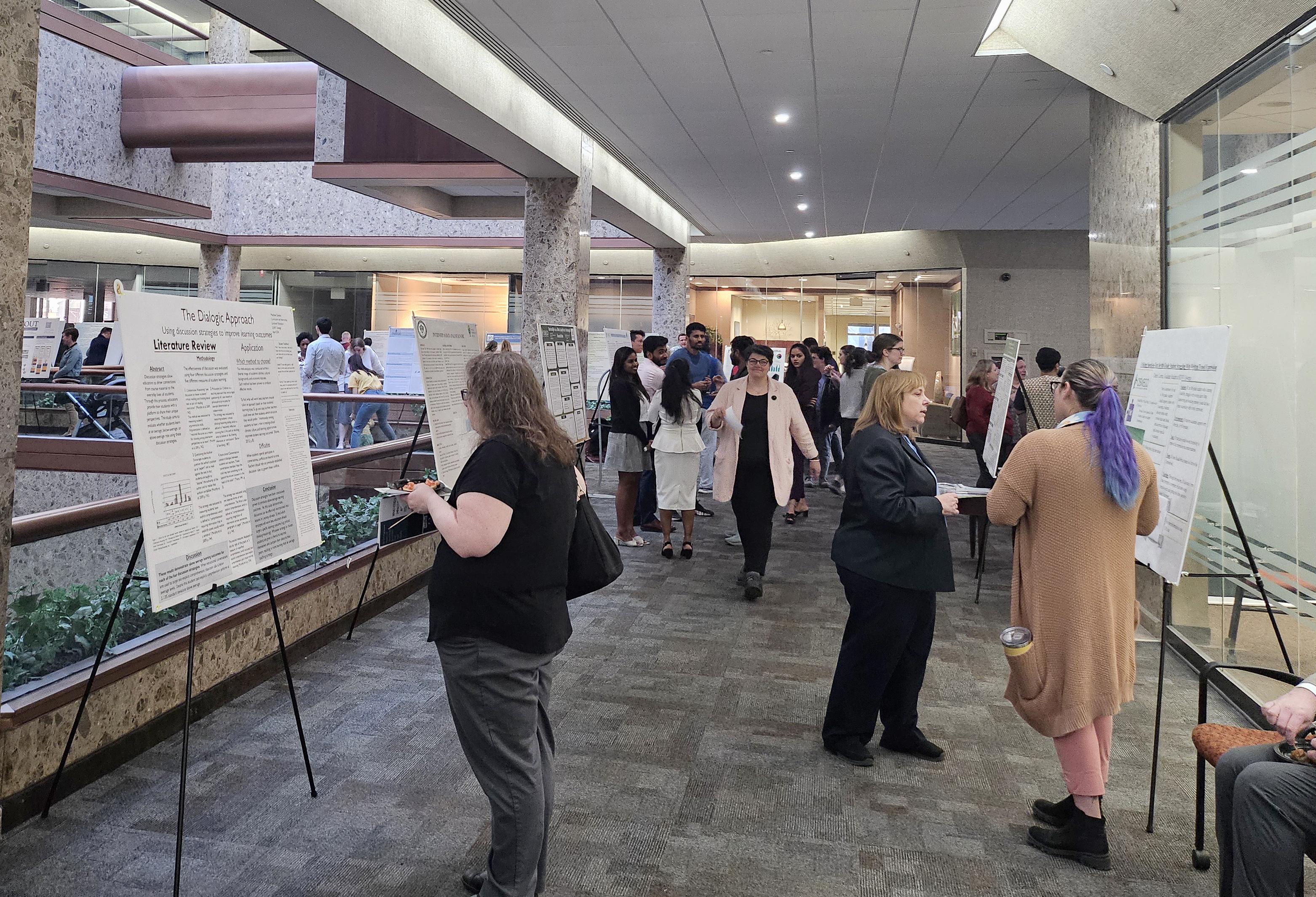Quest, the annual celebration of scholarly and creative activity, kicks off with an informative poster session at the Syracuse Campus from 5:30 to 7 p.m. on Tuesday, April 22, before unfolding on Oswego's lakeside campus on Wednesday, April 23. (Photo by Kristen Eichhorn)
SUNY Oswego’s Quest celebration of research and scholarly activity will feature a wide range of disciplines, topics and interactions with posters, presentations, performances and more.
The Quest kickoff returns to SUNY Oswego’s Syracuse Campus with a variety of poster presentations from 5:30 to 7 p.m. on Tuesday, April 22.
Quest then encompasses much of the main campus on Wednesday, April 23, unfolding between 8 a.m. and 7 p.m.
Keynote speaker Lars Rudstam, director of the Cornell Biological Field Station and a professor of natural resources and the environment, will present “Ecological interactions in one of the world’s largest lakes –- next door Lake Ontario -– and thoughts on ecological forecasting” from 1 to 2 p.m. in the Marano Campus Center auditorium, room 132.
The keynote connects with SUNY Oswego’s emerging work with its recent establishment of the Great Lakes Institute and as a partner in the landmark Lake Ontario National Marine Sanctuary, which earned federal approval in 2024.
The Quest poster session, from 2 to 3 p.m. in the Marano Campus Center’s Deborah F. Stanley Arena and Convocation Hall, is an annual highlight where dozens of students showcase posters describing their research, with an opportunity for visitors to discuss this work to learn more.
But activities on April 22 and 23 span and connect academic areas, and address contemporary and emerging issues, in many ways.
Exploring medicine, gender, culture
A panel featuring sociology faculty member Jennifer Hites-Thomas and students will examine gender and culture during a session titled “Constructing Normal: Diagnoses, Bodies, and the Cultural Logics of Medicine” from noon to 1 p.m. in 111 Mahar Hall.
Hites-Thomas will present “Intersex or Binary Sex? How Medicine Draws the Boundary,” exploring how medicine organizes some bodies into the sex binary as either female or male (endosex) while categorizing others as intersex. By comparing two diagnoses, Hites-Thomas’ project examines how doctors frame infertility as an endosex condition even though it shares traits, symptoms, treatments and the same genetic cause as an intersex variation.
Bri Williams will discuss “Constructing Diagnostic Categories: How Science and Medicine are Cultural Practices, examining how social factors such as white supremacy, capitalism, patriarchy and others shape the practices of science and medicine, particularly in diagnosis. In the process, Williams looks to answer the question of how science and medicine are inherently informed by culture and society.
Rowan Tetro will present “The Social Construction of Bodies: The Myth of the Sex Binary,” which also earned the Diana Balmori Award from the gender and women's studies program for best student paper. Tetro will explore concepts of what makes a body “normal,” as well as how medicine, government and everyday people categorize bodies into the sex binary. The presentation will look at how bodies are shaped to fit within “female” or “male” categories and how the creation of these categories is rooted in racist, colonial and anti-queer ideology.
Examining athletics, mental wellness
An extended session from 11 a.m. to noon in 221 Rich Hall will provide multiple perspectives on mental wellness for student-athletes.
“Student Athlete Health and Wellness: from the Eyes of Three Beholders: Current Student Athlete, Varsity Coach, and Former Student Athlete” will feature Barry A. Friedman, a School of Business professor; Jason Leone, coach of the Laker men's basketball team; Tianna Crockett, embedded mental health counselor for Athletics; Lauren Schell, a senior on the women's hockey team and human resources management major.
This presentation will provide insights into the unique challenges faced by student-athletes and effective coping strategies. Attendees will hear perspectives from a Laker student-athlete, a varsity coach and a former athlete, and learn about valuable resources that support well-being for all students.
Focusing on upcycling
As part of an art and design showcase from 3 to 6 p.m. in the Tyler Hall lobby, graphic design major Jack Hyland will present “Hylism Helps,” a project that focuses on selling upcycled clothing to raise funds for local charities.
Part of a project that earned a grant from the university’s Student Office of Research and Creative Activities, Hyland’s Quest presentation will showcase design work while educating attendees about clothing sustainability.
“Using my skills in graphic design and various artistic methods, I will transform thrifted or donated garments into affordable yet stylish pieces,” Hyland wrote in the grant proposal. “By donating profits to charity and giving away clothing for free, this project combines artistic expression with community impact. The ultimate goal is to foster creativity, collaboration and social responsibility while addressing the growing need for sustainable fashion solutions.”
In addition to donating funds raised through sales to charity, Hyland planned to distribute additional free clothing through charitable channels.
The showcase in the Tyler Hall lobby will feature a range of student talents and media from SUNY Oswego’s art and design programs.
Tyler Hall will host other creative work as well, including screenings from the "Acting for the Camera" course from 11 a.m. to noon in 42 Tyler Hall; the "10-minute Play Lab" from noon to 2 p.m. in Tyler Hall's lab theatre; an audio production showcase from 2 to 2:50 in 50 Tyler Hall, with students discussing and playing samples from their music recording projects; and the Music Department Honors Recital from 3 to 3:50 p.m., also in 50 Tyler Hall.
For a full Quest schedule and more information, visit oswego.edu/quest.




